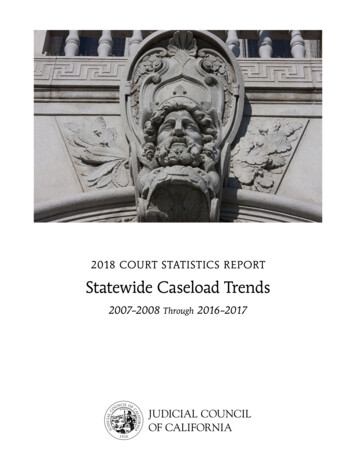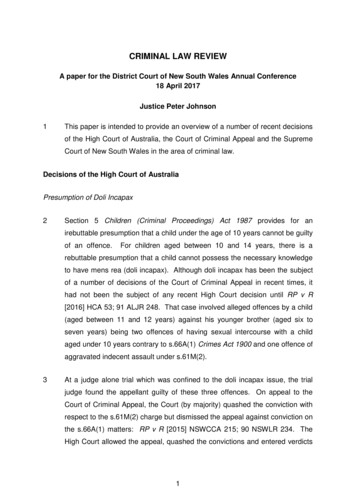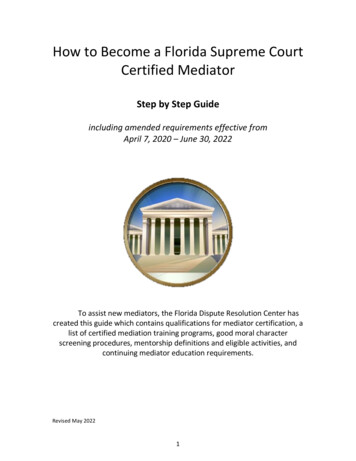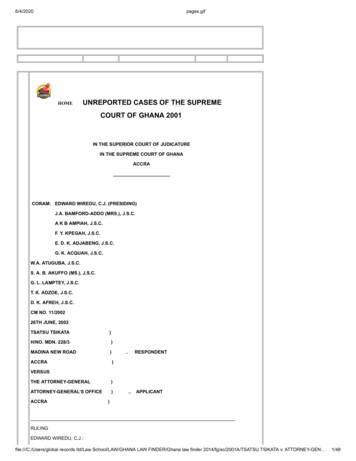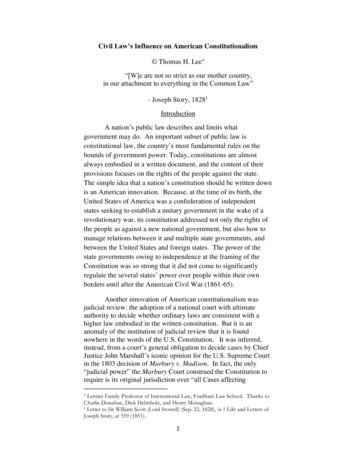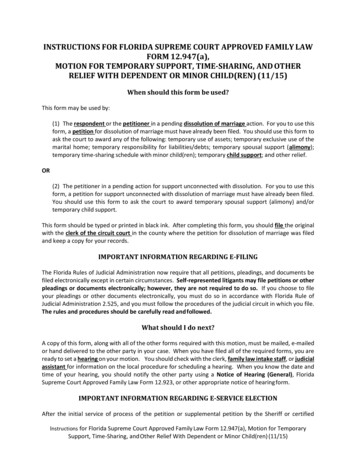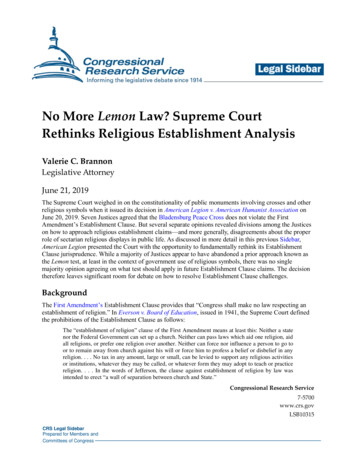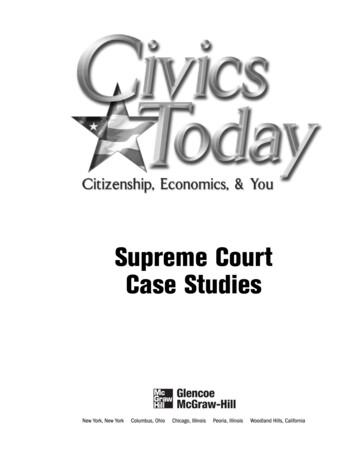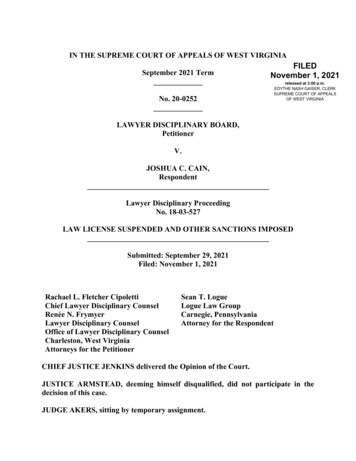
Transcription
IN THE SUPREME COURT OF APPEALS OF WEST VIRGINIASeptember 2021 TermFILEDNovember 1, 2021No. 20-0252released at 3:00 p.m.EDYTHE NASH GAISER, CLERKSUPREME COURT OF APPEALSOF WEST VIRGINIALAWYER DISCIPLINARY BOARD,PetitionerV.JOSHUA C. CAIN,RespondentLawyer Disciplinary ProceedingNo. 18-03-527LAW LICENSE SUSPENDED AND OTHER SANCTIONS IMPOSEDSubmitted: September 29, 2021Filed: November 1, 2021Rachael L. Fletcher CipolettiChief Lawyer Disciplinary CounselRenée N. FrymyerLawyer Disciplinary CounselOffice of Lawyer Disciplinary CounselCharleston, West VirginiaAttorneys for the PetitionerSean T. LogueLogue Law GroupCarnegie, PennsylvaniaAttorney for the RespondentCHIEF JUSTICE JENKINS delivered the Opinion of the Court.JUSTICE ARMSTEAD, deeming himself disqualified, did not participate in thedecision of this case.JUDGE AKERS, sitting by temporary assignment.
SYLLABUS BY THE COURT1.“A de novo standard applies to a review of the adjudicatory recordmade before the [Hearing Panel Subcommittee of the Lawyer Disciplinary Board (‘HPS’)]as to questions of law, questions of application of the law to the facts, and questions ofappropriate sanctions; this Court gives respectful consideration to the [HPS’s]recommendations while ultimately exercising its own independent judgment. On the otherhand, substantial deference is given to the [HPS’s] findings of fact, unless such findingsare not supported by reliable, probative, and substantial evidence on the whole record.”Syllabus point 3, Committee on Legal Ethics v. McCorkle, 192 W. Va. 286, 452 S.E.2d 377(1994).2.“This Court is the final arbiter of legal ethics problems and must makethe ultimate decisions about public reprimands, suspensions[,] or annulments of attorneys’licenses to practice law.” Syllabus point 3, Committee on Legal Ethics v. Blair, 174 W. Va.494, 327 S.E.2d 671 (1984).3.“Rule 3.7 of the Rules of Lawyer Disciplinary Procedure . . . requiresthe Office of Disciplinary Counsel to prove the allegations of the formal charge by clearand convincing evidence.” Syllabus point 1, in part, Lawyer Disciplinary Board v.McGraw, 194 W. Va. 788, 461 S.E.2d 850 (1995).i
4.“Rule 3.16 of the West Virginia Rules of Lawyer DisciplinaryProcedure enumerates factors to be considered in imposing sanctions and provides asfollows: ‘In imposing a sanction after a finding of lawyer misconduct, unless otherwiseprovided in these rules, the Court [West Virginia Supreme Court of Appeals] or Board[Lawyer Disciplinary Board] shall consider the following factors: (1) whether the lawyerhas violated a duty owed to a client, to the public, to the legal system, or to the profession;(2) whether the lawyer acted intentionally, knowingly, or negligently; (3) the amount ofthe actual or potential injury caused by the lawyer’s misconduct; and (4) the existence ofany aggravating or mitigating factors.’” Syllabus point 4, Office of Lawyer DisciplinaryCounsel v. Jordan, 204 W. Va. 495, 513 S.E.2d 722 (1998).5.“Mitigating factors in a lawyer disciplinary proceeding are anyconsiderations or factors that may justify a reduction in the degree of discipline to beimposed.” Syllabus point 2, Lawyer Disciplinary Board v. Scott, 213 W. Va. 209, 579S.E.2d 550 (2003).6.“Mitigating factors which may be considered in determining theappropriate sanction to be imposed against a lawyer for violating the Rules of ProfessionalConduct include: (1) absence of a prior disciplinary record; (2) absence of a dishonest orselfish motive; (3) personal or emotional problems; (4) timely good faith effort to makerestitution or to rectify consequences of misconduct; (5) full and free disclosure todisciplinary board or cooperative attitude toward proceedings; (6) inexperience in theii
practice of law; (7) character or reputation; (8) physical or mental disability or impairment;(9) delay in disciplinary proceedings; (10) interim rehabilitation; (11) imposition of otherpenalties or sanctions; (12) remorse; and (13) remoteness of prior offenses.” Syllabuspoint 3, Lawyer Disciplinary Board v. Scott, 213 W. Va. 209, 579 S.E.2d 550 (2003).7.“Aggravating factors in a lawyer disciplinary proceeding are anyconsiderations or factors that may justify an increase in the degree of discipline to beimposed.” Syllabus point 4, Lawyer Disciplinary Board v. Scott, 213 W. Va. 209, 579S.E.2d 550 (2003).iii
Jenkins, Chief Justice:This lawyer disciplinary proceeding is before us upon the objection ofRespondent Joshua C. Cain, Esq. (“Mr. Cain”) to the recommended discipline of theHearing Panel Subcommittee (“HPS”) of the Lawyer Disciplinary Board (“LDB”), arisingfrom a single disciplinary complaint. Mr. Cain was found to have violated several WestVirginia Rules of Professional Conduct because of his overbilling the West Virginia PublicDefender Services (“PDS”). The HPS recommended that Mr. Cain be subjected to a 180day suspension and two-year supervised practice upon reinstatement; remain compliantwith a West Virginia Judicial and Lawyer Assistance Program (“WVJLAP”) monitoringagreement; and pay all costs of these disciplinary proceedings. The Office of DisciplinaryCounsel (“ODC”) consented to the recommendation of the HPS. Mr. Cain’s sole objectionis to the recommended sanction. He argues that he should instead be subjected to only aninety-day suspension rather than the recommended 180-day suspension.After a thorough review of the record developed before the HPS, and uponcareful consideration of the parties’ briefs and oral arguments and the relevant law, thisCourt agrees that Mr. Cain has violated multiple Rules of Professional Conduct andapproves of the recommendations of the HPS. In addition to the recommended sanctionsof the HPS, we further order that Mr. Cain must complete six hours of Continuing LegalEducation (“CLE”) in law practice management over and above the customaryrequirement.1
I.FACTUAL AND PROCEDURAL HISTORYMr. Cain was admitted to the West Virginia State Bar in April of 2011 andpractices in and around Moundsville, West Virginia. 1 Accordingly, he is subject to thedisciplinary jurisdiction of this Court and its properly constituted LDB. Below we set outthe conduct underlying this disciplinary matter as well as the relevant procedural history.A. Underlying Conduct and Factual BackgroundOn August 31, 2017, Dana Eddy, Esq. (“Mr. Eddy”), the Executive Directorof the PDS, received an email from the Honorable Jeffrey Cramer, Judge of the SecondJudicial Circuit, West Virginia, explaining that Mr. Cain had submitted to the Judge eightyfive payment vouchers accompanied by a proposed order approving payment of appointedcounsel fees and expenses for each of the vouchers. 21Judge Cramer noted in theMoundsville, West Virginia, is located in Marshall County, West Virginia.Mr. Cain’s law practice includes court-appointed work in both the First andSecond Judicial Circuits of West Virginia. West Virginia Code section 29-21-13a (eff.2008) provides the statutory scheme that outlines how court-appointed attorneys are to bereimbursed for their time and expenses by the State of West Virginia. Although this statutewas amended in 2019, we rely upon the 2008 version that was in effect when Mr. Caincommitted his misconduct. Specifically, this statute requires the attorney to “maintaindetailed and accurate records of the time expended and expenses incurred on behalf ofeligible clients[.]” Id. at § 13a(a). Additionally, claims for reimbursement in each case aremade through vouchers that are first submitted to the appointing circuit court judge forapproval, and are then forwarded to the PDS for review and payment. Id. Attorneys arecompensated by the PDS for “actual and necessary time expended for services performedand expenses incurred[.]” Id. at § 13a(d) (emphasis added).22
correspondence that many of the vouchers concerned matters for which a final dispositionhad been made eight to ten months before submission of the vouchers. Judge Cramerfurther explained that upon his inspection of the submitted payment vouchers, he observedadditional irregularities.These irregularities included, but were not limited to, thefollowing: (1) many of the vouchers contained unreasonable amounts of time opening,reviewing, and closing files; (2) at least one voucher billed for a hearing that had notoccurred; (3) many of the vouchers contained entries where Mr. Cain billed 1.5 hours oftravel time to every Marshall County proceeding despite living in Moundsville, which iswhere the Marshall County Courthouse is located; and (4) many of the vouchers containedcopying expenses that were excessive. Judge Cramer requested guidance from the PDS onhow to proceed.This correspondence by Judge Cramer prompted an extensiveinvestigation by the PDS into Mr. Cain’s billing practices, including traveling to theMarshall County Courthouse to review the vouchers, and ultimately referring the matter tothe Commission on Special Investigations. 3After a year of investigation, in November of 2018, Mr. Eddy filed acomplaint with the LDB regarding Mr. Cain’s overbilling practices in five specific areas.The Commission on Special Investigations was originally created by theLegislature in September 1968 as the Purchasing Practices and Procedures Commission.It has continued as a statutory body and is now called the Commission on SpecialInvestigations. Pursuant to West Virginia Code section 4-5-2, the duties and powers of theCommission on Special Investigations include, but are not limited to, investigating mattersinvolving malfeasance, misfeasance or nonfeasance in office by any employee or officerof the state; determining if any criminal or civil statutes have been violated at any level ofstate government; and determining whether to recommend criminal prosecution or civil33
The first issue raised concerns over the date of the submission of the payment vouchers.Specifically, West Virginia Code section 29-21-13a (eff. 2008) provides, 4 in relevant part,that payment vouchers “submitted more than ninety calendar days after the last date ofservice shall be rejected, unless for good cause, the appointing court authorizes in writingan extension[.]” Mr. Eddy advised that several of the vouchers Mr. Cain submitted relatedto cases for which final disposition had been made at least eight to ten months beforesubmission of the vouchers. Furthermore, it was alleged that Mr. Cain had his paymentvouchers returned by Judge Mark Karl, Judge of the Second Judicial Circuit 5 in 2013 forbeing “excessive,” and that, as a result, Mr. Cain purposefully waited until Judge Karlretired before submitting any additional vouchers in Marshall County. Accordingly, Mr.Eddy asserted that Mr. Cain invented a last date of service within the appropriate ninetyday timeframe to “make the voucher appear to be timely submitted.”The next area raised in the complaint concerned the travel billed by Mr. Cain.In particular, Mr. Eddy questioned whether Mr. Cain “billed for travel to and from hisMarshall County residence[,] which is closer to the venues involved or for travel to andfrom [his] ‘Cameron’ office[.]” Also, while Mr. Cain claimed to maintain an office spaceaction for any violation, either criminal or civil, at any level of state government. SeeW. Va. Code § 4-5-2 (eff. 2013).in 2015.4See supra note 2.5Judge Karl was a Judge of the Second Judicial Circuit until his retirement4
in Cameron, and contended that he billed for travel between Cameron and the NorthernRegional Jail or Marshall County Courthouse, an investigator from the Commission onSpecial Investigations reported that the office space was “in a state of disrepair andshambles,” that “no phones or computer equipment [could] be seen,” and that “[b]oxes[were] strewn everywhere[.]” According to the complaint, the office space was used forstorage, and it was not equipped to be an everyday functional office.The third matter raised in the complaint related to the amount of time Mr.Cain billed for waiting in court. It was asserted that, “almost exclusively, [Mr.] Cain billsa [0].5 hour for waiting in court.” Mr. Cain’s explanation for this billing practice was thathe always arrived to court half an hour early; however, there is at least one instance inwhich a Marshall County Courthouse security video showed that Mr. Cain arrived at thetime of a hearing but billed thirty minutes for waiting. Aside from issues regarding billingtime waiting for court, the fifth issue raised concerns regarding the amount of time Mr.Cain billed for in-court proceedings. Specifically, Mr. Cain billed one hour for a significantnumber of hearings, and many others were billed in one-hour segments. However, JudgeCramer indicated that most of his hearings did not last anywhere near an hour. Finally, thecomplaint asserted that there were several other general issues with Mr. Cain’s billingpractices, including that Mr. Cain engaged in “pattern” billing regarding requestingreimbursement for copies and for time spent making digital backups of his files, and thatthese are administrative tasks that are not compensable.5
Mr. Cain filed a response indicating that Mr. Eddy had “been extremelyadversarial with [him] through this process and has waited over a year since [he] submitted[his] bills before filing a complaint, so most if any physical proof [he] would have showing[he] was in [his] office is gone.” He further attempted to generally explain his billingpractices by asserting that he hasendeavored to comply with the rules and regulations of thePD[S] office but that is a hard thing to do because there are norules or regulations, so the best I can do is call on occasion orget back returned vouchers for some error and try to change myprocedures to accommodate. On more than one occasion Ihave been given contradictory information on how to bill formy time.B. Statement of Charges by the LDB and HearingA Statement of Charges was filed against Mr. Cain in March of 2020 by theInvestigative Panel of the LDB, formally charging him with violating several Rules ofProfessional Conduct. 6 In particular, the Statement of Charges alleged that by engaging inBecause the misconduct occurred after 2015, the current version of the WestVirginia Rules of Professional Conduct applies to the instant matter. We note that both theODC and the HPS quote the prior version of only Rule 1.5 in the documents filed in thematter. However, utilizing the language of either version of Rule 1.5, Mr. Cain has violatedthat Rule under the circumstances of this case.66
these billing activities, Mr. Cain violated Rule 3.3, 7 Rule 1.5, 8 Rule 8.4(c), 9 and Rule8.4(d) 10 of the West Virginia Rules of Professional Conduct.7Rule 3.3(a)(1) of the West Virginia Rules of Professional Conduct provides:(a) A lawyer shall not knowingly:(1) make a false statement of fact or law to a tribunal orfail to correct a false statement of material fact or lawpreviously made to the tribunal by the lawyer[.]8Rule 1.5(a) of the West Virginia Rules of Professional Conduct provides:(a) A lawyer shall not make an agreement for, charge,or collect an unreasonable fee or an unreasonable amount forexpenses. The factors to be considered in determining thereasonableness of a fee include the following:(1) the time and labor required, the novelty anddifficulty of the questions involved, and skill requisite toperform the legal service properly;(2) the likelihood that the acceptance of the particularemployment will preclude other employment by the lawyer;(3) the fee customarily charged in the locality for similarlegal services;(4) the amount involved and results obtained;(5) the time limitations imposed by the client or by thecircumstances;(6) the nature and length of the professional relationshipwith the client;(7) the experience, reputation, and ability of the lawyeror lawyers performing the services; and(8) whether the fee is fixed or contingent.Rule 8.4(c) of the West Virginia Rules of Professional Conduct providesthat it is professional misconduct for a lawyer to “engage in conduct involving dishonesty,fraud, deceit[,] or misrepresentation[.]”9Rule 8.4(d) of the West Virginia Rules of Professional Conduct providesthat it is professional misconduct for a lawyer to “engage in conduct that is prejudicial tothe administration of justice[.]”107
In response to the Statement of Charges, Mr. Cain filed an Answer. In hisAnswer, Mr. Cain admitted that he “avoided submitting the vouchers for approval by eitherJudge Karl or Judge [David W.] Hummel, [Jr., Judge of the Second Judicial Circuit,] asJudge Karl had already returned the vouchers as excessive.” He further admitted that thevouchers he submitted to Judge Cramer were not timely submitted, that he “claimed milesthat were not traveled,” that his “Cameron office was mostly used as storage space and[was] not a functional everyday office,” that he “consistently billed for waiting in courtwhen he did not actually wait in court,” that he “billed for 253 hours of ‘digital backup’even though this is an administrative task that is not billable,” that he billed for a hearingthat did not occur, and that he “overbilled for post-sentencing matters, copying, jail visits,travel to the jail facility, hearings, and duplicate travel[.]” Moreover, Mr. Cain contended,for the first time, that he suffers from severe depression and anxiety, and that these mentalillnesses “had a substantial impact on his professional actions.” He also claimed to sufferfrom a severe cannabis addiction that impacted his behavior.The HPS held a telephonic pre-hearing in September of 2020. During thepre-hearing, both parties informed the HPS that they were working with WVJLAP todevelop a monitoring agreement for Mr. Cain, which he subsequently entered. The matterthen proceeded to a hearing before the HPS on the Statement of Charges in December of2020 where Mr. Cain testified. The HPS also heard testimony from Amber Hanna, theProgram Coordinator for the WVJLAP, regarding Mr. Cain’s monitoring agreement; andthree character witnesses for Mr. Cain: Samuel White, Carrie Scott, and Terry McDiffitt.8
During the hearing, the ODC and Mr. Cain submitted joint stipulationsregarding findings of fact and conclusions of law, and subsequent to the hearing, the ODCand Mr. Cain submitted joint findings of fact, conclusions of law, and recommendedsanctions, to the HPS. These joint stipulations and joint findings of fact, conclusions oflaw, and recommend sanctions mirrored the previous admissions from Mr. Cain’s Answerto the Statement of Charges. In addition, Mr. Cain admitted that his conduct violated Rules3.3(a)(1), 1.5(a), and 8.4(c) and (d) of the Rules of Professional Conduct and that he actedintentionally and knowingly. The ODC and Mr. Cain agreed that Mr. Cain’s law licenseshould be suspended for ninety days, that he be placed on two years of supervised practice,that he be required to remain compliant with the requirements of the WVJLAP monitoringagreement, and that he pay the costs of the proceedings.C. HPS Report and Recommended SanctionsThe HPS filed its Report on April 19, 2021. The report made findings andconclusions almost identical to those presented in the joint findings of fact, conclusions oflaw, and recommended sanctions. However, the HPS deviated from the joint filing as tothe sanctions. The HPS concluded that,[t]he Hearing Panel agrees with the nonbindingstipulated sanctions except that based on the aforesaid caselaw, the nature of the violations, and the intent of [Mr. Cain] incommitting the violations, this Hearing Panel believes that asuspension of [Mr. Cain]’s law practice for a period of 180days is more appropriate than 90 days.9
Accordingly, the HPS recommended the following disposition: (1) that Mr. Cain’s lawlicense be immediately suspended for 180 days and that he be ordered to fully comply withRules 3.28 and 3.32 11 of the Rules of Lawyer Disciplinary Procedure 12 upon reinstatement;(2) that Mr. Cain be placed on two years of supervised practice by an active attorney ingood standing with the bar in his geographic area; (3) that Mr. Cain remain compliant withthe monitoring agreement he entered into with the WVJLAP; and (4) that Mr. Cain pay thecosts of the disciplinary proceedings. The ODC consented to the recommendation of theHPS. However, Mr. Cain filed his objection to the recommended sanctions asserting thata suspension of 180 days “imposes a great hardship on [him] as it mandates a reapplicationto The West Virginia State Bar.” On May 21, 2021, this Court ordered that this matter bescheduled for oral argument under Rule 19 of the West Virginia Rules of AppellateProcedure. Mr. Cain now asks this Court to impose a ninety-day suspension rather thanthe 180-day suspension recommended by the HPS.While the HPS stated in its Report that Mr. Cain must comply with Rule3.31, this must have been a clerical error as that Rule applies to the reinstatement processfor a lawyer who has been suspended for a period of three months or less, and therefore,would not be applicable to Mr. Cain. Accordingly, we believe the HPS more accuratelyintended to cite to Rule 3.32 of the Rules of Lawyer Disciplinary Procedure which appliesto lawyers whose license to practice law has been or shall be suspended for a period ofmore than three months.11Rule 3.28 of the Rules of Lawyer Disciplinary Procedure explains theduties of disbarred or suspended lawyers. Rule 3.32 of the Rules of Lawyer DisciplinaryProcedure describes the procedure lawyers whose license to practice law has been or shallbe suspended for a period of more than three months must undertake to have their lawlicense reinstated.1210
II.STANDARD OF REVIEWWhen this Court considers a lawyer disciplinary matter,[a] de novo standard applies to a review of theadjudicatory record made before the [Hearing PanelSubcommittee of the Lawyer Disciplinary Board (“HPS”)] asto questions of law, questions of application of the law to thefacts, and questions of appropriate sanctions; this Court givesrespectful consideration to the [HPS’s] recommendationswhile ultimately exercising its own independent judgment. Onthe other hand, substantial deference is given to the [HPS’s]findings of fact, unless such findings are not supported byreliable, probative, and substantial evidence on the wholerecord.Syl. pt. 3, Comm. on Legal Ethics v. McCorkle, 192 W. Va. 286, 452 S.E.2d 377 (1994).Further, while we give respectful consideration to the HPS’s recommendations on theappropriate sanctions to impose, “[t]his Court is the final arbiter of legal ethics problemsand must make the ultimate decisions about public reprimands, suspensions[,] orannulments of attorneys’ licenses to practice law.” Syl. pt. 3, Comm. on Legal Ethics v.Blair, 174 W. Va. 494, 327 S.E.2d 671 (1984).Finally, to ensure the highest quality of legal services in this State, we alsohave stated that “[a]ttorney disciplinary proceedings are not designed solely to punish theattorney, but rather to protect the public, to reassure it as to the reliability and integrity ofattorneys[,] and to safeguard its interest in the administration of justice.” Law. Disc. Bd.v. Taylor, 192 W. Va. 139, 144, 451 S.E.2d 440, 445 (1994) (per curiam). With thesestandards in mind, we proceed to consider the arguments before the Court.11
III.DISCUSSIONAt the outset, we are mindful that “Rule 3.7 of the Rules of LawyerDisciplinary Procedure . . . requires the Office of Disciplinary Counsel to prove theallegations of the formal charge by clear and convincing evidence.” Syl. pt. 1, in part, Law.Disc. Bd. v. McGraw, 194 W. Va. 788, 461 S.E.2d 850 (1995). In the present matter, Mr.Cain has stipulated to having violated Rule 1.5, Rule 3.3, and Rule 8.4 of the West VirginiaRules of Professional Conduct, and we, therefore, find no basis to disturb the HPS’sdetermination that those Rules were violated. As such, we need only consider theproportionality of the punishment in determining the appropriate sanctions for Mr. Cain’sconduct. As discussed above, the HPS recommends a 180-day suspension of Mr. Cain’slaw license. The ODC fully supports this recommendation. Mr. Cain asks this Court toimpose only a ninety-day suspension.In determining an appropriate sanction, this Court is guided by Syllabus point4 of Office of Lawyer Disciplinary Counsel v. Jordan, 204 W. Va. 495, 513 S.E.2d 722(1998):Rule 3.16 of the West Virginia Rules of LawyerDisciplinary Procedure enumerates factors to be considered inimposing sanctions and provides as follows: “In imposing asanction after a finding of lawyer misconduct, unless otherwiseprovided in these rules, the Court [West Virginia SupremeCourt of Appeals] or Board [Lawyer Disciplinary Board] shallconsider the following factors: (1) whether the lawyer hasviolated a duty owed to a client, to the public, to the legalsystem, or to the profession; (2) whether the lawyer acted12
intentionally, knowingly, or negligently; (3) the amount of theactual or potential injury caused by the lawyer’s misconduct;and (4) the existence of any aggravating or mitigating factors.”Examining the first Jordan factor, the HPS found, and we agree, that Mr. Cain violatedseveral duties owed to his clients, the public, to the legal system, and to the profession.Here, Mr. Cain’s “billing practices fell short of the duties owed to the public and to thelegal profession.” Law. Disc. Bd. v. Hassan, 241 W. Va. 298, 304, 824 S.E.2d 224, 230(2019). We concur with the HPS’s commentary in its Report that “[l]awyers are officersof the court, and as such, must operate within the bounds of the law and abide by the rulesof procedure which govern the administration of justice in our state.” “As officers of thecourt, lawyers are required to act in a manner that maintains the integrity of the bar. Byfiling false vouchers with the PDS, the general public’s expectation that a lawyer shallexhibit the highest standards of honesty and integrity was not met.” Hassan, 241 W. Va.at 304, 824 S.E.2d at 230 (footnote omitted).Next, we must consider the second Jordan factor by determining whetherMr. Cain acted knowingly, intentionally, or negligently. The HPS concluded that Mr. Cainacted knowingly and intentionally. We agree. Mr. Cain has admitted throughout theseproceedings that his conduct was knowing and intentional. We particularly find egregiousthat Mr. Cain purposefully avoided submitting his payment vouchers until a new judge wason the bench to avoid submitting them to the judge who had previously found them to beexcessive and questionable.13
Turning to the third Jordan factor, we must determine if Mr. Cain’s conductcaused injury or potential injury. Unlike most other inappropriate billing matters that haverecently been before this Court, in this instance, there was, fortunately, no known harm toMr. Cain’s clients and no restitution owed to the PDS because the circuit court neversubmitted the vouchers at issue for payment. However, we agree with the HPS that underthese specific circumstances there was an actual injury because Mr. Cain’s conduct forcedthe PDS to divert its resources to investigate his improper billing practices. Mr. Cainfurther has admitted in the joint stipulations that generally “[t]here is . . . a substantialimpact on the legal profession generated by lawyer overbilling[,]” and that his“noncompliance with these rules as exhibited in the record is clearly detrimental to thelegal system and legal profession, and his conduct has brought the legal system and legalprofession into disrepute.”Applying the fourth Jordan factor, we must consider whether there is anyaggravating or mitigating evidence relevant to the issue of what sanction should beimposed. This Court has held that “[m]itigating factors in a lawyer disciplinary proceedingare any considerations or factors that may justify a reduction in the degree of discipline tobe imposed.” Syl. pt. 2, Law. Disc. Bd. v. Scott, 213 W. Va. 209, 579 S.E.2d 550 (2003).We further have held that mitigating factors may include any of the following:Mitigating factors which may be considered indetermining the appropriate sanction to be imposed against alawyer for violating the Rules of Professional Conduct include:(1) absence of a prior disciplinary record; (2) absence of adishonest or selfish motive; (3) personal or emotional14
problems; (4) timely good faith effort to make restitution or torectify consequences of misconduct; (5) full and freedisclosure to disciplinary board or cooperative attitude towardproceedings; (6) inexperience in the practice of law;(7) character or reputation; (8) physical or mental disability orimpairment; (9) delay in disciplinary proceedings; (10) interimrehabilitation; (11) imposition of other penalties or sanctions;(12) remorse; and (13) remoteness of prior offenses.Syl. pt. 3, id. On the other hand, we have explained that “[a]ggravating factors in a lawyerdisciplinary proceeding are any considerations or factors that may justify an increase in thedegree of discipline to be imposed.” Syl. pt. 4, id.The HPS found that there were four mitigating factors in this matter:(1) inexperience in the practice of law, (2) personal or emotional problems, (3) full and freedisclosure to the LDB, and (4) remorse. We agree with the HPS’s conclusions as to thesemitigating factors. However, the HPS found the presence of several aggravating factors inthis case, and we agree with those findings as well. Most significantly, the HPS found thatMr. Cain had a dishonest or selfish motive in his overbilling PDS. Additionally, onDecember 8, 2017, the Investigative Panel admonished Mr. Cain for violating Rule 1.4 andRule 1.3 of the West Virginia Rules of Professional Conduct. As this Court previously hasexplained, an Investigative Panel admonishment is “aggravating just like any otherdisciplinary action.” Law. Disc. Bd. v. Sturm, 237 W. Va. 115, 128, 785 S.E.2d 821, 834(2016).15
Regrettably, in recent years, this Court has had the opportunity to examinethe issue of at
Sean T. Logue Logue Law Group . Carnegie , Pennsylvania . Attorney for the Respondent . FILED November 1, 2021 . released at 3:00 p.m. EDYTHE NASH GAISER, CLERK . SUPREME COURT OF APPEALS . OF WEST VIRGINIA; i ; SYLLABUS BY THE COURT ; 1. "A de novostandard applies to a review of the adjudicatory record


